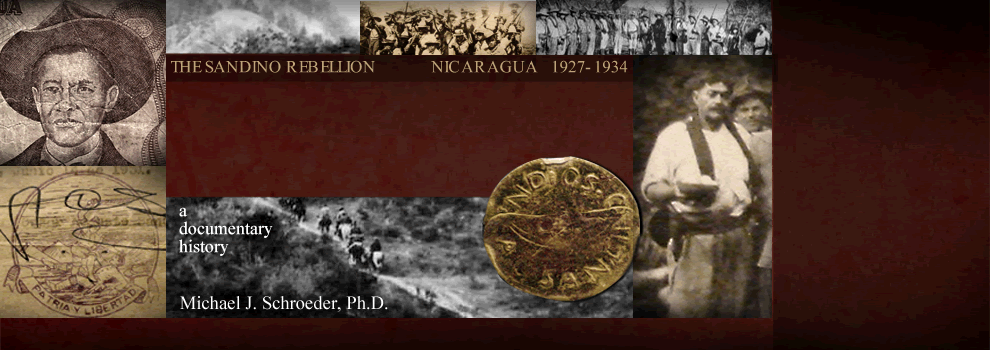| |
|
G U A R D I A
M —
D O C S |
|
—1927 |
1928 |
1929 |
1930 |
1931 |
1932 |
1933 + |
|
1
|
2
|
3
|
4
|
5
|
6
|
7
|
8
|
9
|
10
|
11
|
12
|
|
1 2 3
4 5 6 |
1 2 3 4 5 6 |
1 2 3 4 5 6 |
1 2 3
4 5 6 |
1 2 3 4 5 6 |
1 2 3 4 5 6 |
1 2 3 4 5 6 |
1 2 3 4 5 6 |
1 2 3 4
5
6 |
1 2
3 4 5
6 |
1 2
3 4 5 6 |
1 2
3 4 5 6 |
|
MILITARY INTELLIGENCE DIVISION,
RG165, ENTRY 77 —
PAGE 1
•
PAGE 2
•
PAGE 3 |
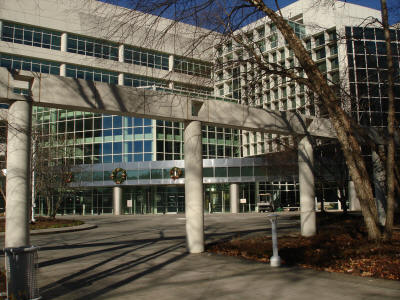 THIS IS THE FIRST OF THREE PAGES
housing documents relating to the
Guardia Nacional (Record Group 165,
Entry 77, Military Intelligence Division
on Nicaragua, 1922-1944) in US National
Archives II in College Park, MD.
This page covers the period 1920—1930.
THIS IS THE FIRST OF THREE PAGES
housing documents relating to the
Guardia Nacional (Record Group 165,
Entry 77, Military Intelligence Division
on Nicaragua, 1922-1944) in US National
Archives II in College Park, MD.
This page covers the period 1920—1930.
Page 2
covers the period Dec. 1930—April 1935,
and
Page 3, the period May
1935—Oct. 1941, after which the series
ends.
In the interwar years, the Military
Intelligence Division was the principal
US agency charged with
gathering & reporting on military intelligence
from around the world. During
World War II it was
folded into the newly-created OSS & soon
after the CIA. This collection is
especially rich on the period from
1933-1939, from the withdrawal of US
military forces from Nicaragua to the
outbreak of the war in Europe. It
is housed together here to preserve
its original character, though in these
pages the
documents are organized chronologically.
The original files convey a sense that
they have been rifled & culled of their
most pointed or potentially
controversial reports & memoranda,
suggested in part by
the seemingly random chronological sequence and
haphazard arrangement of the material.
Apparently all that remain are carbon
copies and newspaper clippings — no signed originals were found.
(Photo: main entrance to
Archives II in College Park, MD)
Grateful appreciation is extended to Mr.
Brandon Ray, Summa Cum
Laude graduate from Ashford
University in Iowa (with a B.A. in
History and a minor in Political
Science) for his meticulous
transcriptions of the documents on this
and the next two web pages of this
collection. Thank you, Brandon!
|
|
|
|
|
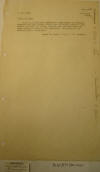
|
2 January 1920.
Excerpt from 1916 Report,
Lt. Ross E. Rowell,
USMC.
[Note:
Rowell's entire 1916 "Military Monograph of
Nicaragua" is accessible via the
GUARDIA HOMEPAGE, and is
also accessible
HERE.]
|
|
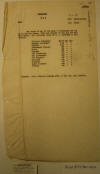
|
November 7,
1921.
Report on Rates of Pay in Nicaraguan Army,
Military Attaché for Central America.
|
|
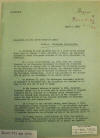
|
March 5, 1925.
Memorandum on the Nicaraguan Constabulary,
Col.
James H. Reeves, p.
1.
"G-2/2028-3 ¶ G-2 ¶
JHB ¶ March 5, 1925. ¶ MEMORANDUM FOR THE
DEPUTY CHIEF OF STAFF: ¶ Subject: Nicaraguan
Constabulary. ¶ 1. Referring to your
penciled note on a letter dated January
28th, from Mr. George F. Lyon, concerning
subject, the following information taken
from press releases of the State Department,
is submitted. ¶ In a letter dated November
14, 1923, from the American Minister to the
Nicaraguan Government (in which the
withdrawal of the Marines in January 1925 is
indicated) the following occurs: “If the
Government of Nicaragua desires, the
American Marines now stationed in Managua
will be directed to organize and instruct
the Nicaraguan Constabulary. Part of the
salaries of the Marines will be paid by the
Government of the United States”. ¶ On
December 13, 1923, the Nicaraguan Government
declared an agreement in principle with the
suggestion but declined to accept at the
time due to lack of funds. ¶ In his inaugral
[inaugural] address on January 1, 1925,
President Solorzano stated that at an early
date he would submit to Congress a project
for the creation of a national guard
(constabulary) which had already been
discussed, and that he was “disposed to
accept the good offices of the American
Government in obtaining instructors for such
organization”. ¶ In a letter to the American
Charge, dated January 7, 1925, the
Nicaraguan Foreign Minister writes: “** the
President expresses his definite desire that
the detachment of American Marines be not
withdrawn, until there shall have been
established under the guidance of American
instructors an efficient service of the
national guard **”. ¶ In a reply thereto,
dated January 15, 1925, the American Charge
states: “The Government of the United States
*** is prepared to accede to that
Government’s request and to permit the
Legation . . . "
|
|
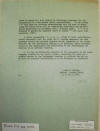
|
March 5, 1925.
Memorandum on the Nicaraguan Constabulary,
Col.
James H. Reeves, p.
2.
" . . . Guard to
remain for such time as is absolutely
necessary for the organization of a new
police force (constabulary). It can accede
**** only upon the definite understanding
that the work of organizing the police force
will be immediately undertaken and
energetically prosecuted in accordance with
a suitable plan”. “*** It is disposed to
permit the Legation Guard to remain *** not
later than September, 1925”. ¶ 2. Major
Messersmith, U. S. M. C., office of Naval
Intelligence, stated informally over the
phone that a working agreement had been
arranged whereby the present Legation Guard,
augmented by two Marine Captains and two
Lieutenants shortly to be detailed, would
forthwith assist in the organization and
instruction of the constabulary but strictly
in an advisory capacity. ¶ 3. G-2 has no
information relative to the statements in
the press clipping attached to Mr. Lyon’s
letter, concerning the call for a special
session of the Nicaraguan Congress to
consider the matter, or that the proposed
constabulary is to be officered by
Americans. ¶ JAMES H. REEVES, ¶ Colonel,
General Staff, ¶ A. C. of S., G-2. ¶ 11s"
|
|
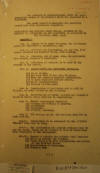
|
July 1925.
Regulations for National Guard School, p. 1.
"For purposes of
administration, drill and ceremonies, the
forces of the National Guard are organized
in a Batallion [Battalion]. ¶ The eight
so-called companies are generally forced
into four provisional companies. ¶
REGULATIONS FOR NATIONAL GUARD SCHOOL,
APPROVED BY THE MINISTER OF GOVERNMENT AND
THE PRESIDENT, AS PRESENTED BY THE DIRECTOR,
JULY, 1925. ¶ CHAPTER I. ¶ Art. 1. School to
be under Director, who is responsible for
instruction, discipline, etc. ¶ Art. 2.
Director and Instructors, as per art. 6 of
decree establishing National Guard, form
faculty. ¶ Art. 3. Students, pay of same,
etc., in conformity with budget, Congress &
Executive. ¶ Art. 4. Selection of students
to be made by the faculty of the school. ¶
Art. 5. REQUIREMENTS FOR ADMISSION,
Officers. ¶ (a) To be single. ¶ (b) Not less
than 18 nor over 26 years. ¶ (c) Pass the
required physical examination. ¶ (d) To have
completed primary school. ¶ (e) Moral
qualifications. ¶ (f) Citizen of Nicaragua.
¶ Art. 6. Examination of candidates may be
held in Managua, or other places in the
republic. ¶ Art. 7. Certificates of birth,
conduct and education required before being
admitted to examination. ¶ Art. 8. Mental
examination includes: ¶ (a) Reading and
writing in Spanish. ¶ (b) Arithmetic. ¶ (c)
Geography. ¶ (d) Probable aptitude. ¶ Art.
9. 70% average in all and not less than 60%
in each subject. ¶ Art. 10. Examination to
be announced in the official “Gaceta” from
time to time. ¶ Art. 11. The instruction for
student officers will be for two years,
which may be reduced to less in accordance
with exigencies of the Government. ¶ Art.
12. Course of studies for officers will
include: ¶ (a) Military Science and Tactics.
¶ (b) Regulations & Special Instructions and
orders of the National Guard. ¶ (c)
Constitution of Nicaragua. ¶ (d) Criminal
Law. . . . "
|
|
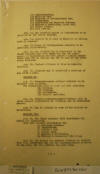
|
July 1925.
Regulations for National Guard School, p.
2.
" . . . (e)
Administration. ¶ (f) Military Law. ¶ (g)
Elements of International Law. ¶ (h)
Topography. ¶ (i) Equitation and Physical
Culture. ¶ (j) Hygiene & Sanitation, first
aid. ¶ (k) Police duties. ¶ (l) Riot duties.
¶ Art. 13. The detailed course of
instruction to be prepared by the school
faculty. ¶ Art. 14. Reports to be sent to
Minister of Government of progress ¶ Art.
15. Names of distinguished students to be
published periodically. ¶ Art. 16. For
eligibility as Lieutenant in the Guard
students must have completed the two year’s
course of instruction and have passed a
mental examination with 70% as average and
60% on each of the foregoing subjects. ¶
Art. 17. Student officers to live in
separate quarters. ¶ Art. 18. Students may
be permitted a furlough of one month a year.
¶ CHAPTER II: ¶ Art. 19. Noncommissioned
officer students to be selected from
enlisted. ¶ The examination will be oral and
will comprise: ¶ (a) Reading. ¶ (b) Writing.
¶ (c) Arithmetic. ¶ (d) General aptitude. ¶
Art. 20. Student noncommissioned officers
will be given general instruction as
officers, but in elementary manner. ¶ Art.
21. May be reduced in case of bad conduct or
deficiency. ¶ CHAPTER III: ¶ Art. 22. The
Guard students will constitute all others
not enumerated. ¶ They will receive
instruction in: ¶ 1. Military science. ¶ 2.
Regulations. ¶ 3. Criminal Law. ¶ 4. Police
duty. ¶ 5. Hygiene & Sanitation. ¶ 6.
Primary & Elementary Schooling. ¶ Art. 23.
The course for student officers is divided
into four semesters; the one for
noncommissioned officers is one year, and
for privates one year also. . . . "
|
|
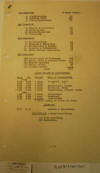
|
July 1925.
Regulations for National Guard School, p.
3.
" . . . 1st Semester:
¶ Maximum Points. ¶ 1. Administration ¶ 25 ¶
2. Infantry Drill ¶ 200 ¶ 3. Firing
Regulations ¶ 50 ¶ 2nd Semester: ¶ 4.
Hygiene & Sanitation ¶ 25 ¶ 5. Military Law
¶ 25 ¶ 6. International Law ¶ 25 ¶ 7.
Topography ¶ 25 ¶ 3rd Semester: ¶ 8.
Fortifications ¶ 25 ¶ 9. Hypology &
Equitation ¶ 25 ¶ 10. Organization & Tactics
¶ 25 ¶ 11. Security & Information ¶ 25 ¶ 12.
Field Service Regulations ¶ 25 ¶ 4th
Semester: ¶ (a) Constitution of Nicaragua ¶
100 ¶ (b) Penal, Civil & Criminal Codes ¶
100 ¶ (c) General Aptitude ¶ 100 ¶ (d)
Police Duties ¶ 50 ¶ (e) Service Record ¶
100 ¶ Total ¶ 1000 ¶ DAILY HORARY OF
INSTRUCTION ¶ From ¶ To ¶ Period ¶ Kind of
Instruction ¶ a.m. ¶ 6:30 ¶ 7:30 ¶ 1 hour ¶
Practical, drill ¶ 7:30 ¶ 8:30 ¶ 1 hour ¶ “
” ¶ 8:30 ¶ 9:30 ¶ 1 hour ¶ Theoretical,
civics ¶ 9:30 ¶ 10:30 ¶ 1 hour ¶ Practical,
drill ¶ 10:30 ¶ 11:30 ¶ 1 hour ¶
Theoretical, primary instr. ¶ p.m. ¶ 1:30 ¶
2:30 ¶ 1 hour ¶ Theoretical ¶ 2:30 ¶ 3:30 ¶
1 hour ¶ Practical ¶ 3:30 ¶ 4:30 ¶ 1 hour ¶
Theoretical ¶ 8 hours daily, 40 hours per
week. ¶ SATURDAY ¶ 8:30 ¶ 10:30 ¶ Reviews &
Inspection. ¶ INCIDENTIALS – Night
Operations. ¶ (a) City patroling
[patrolling]. ¶ (b) Outguards. . . . "
|
|
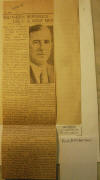
|
August 9, 1925.
Newspaper clipping from the
Baltimore Sun,
"Southern Republics Use U.S. Army Men: Major
Carter to Organize Nicaraguan Constabulary,"
p. 1.
"SOUTHERN REPUBLICS
USE U. S. ARMY MEN ¶ Major Carter To
Organize Nicaragua Constabulary As Check To
Revolutionary Elements. Other Nations Plan
Similar Arrangements. ¶ MAJOR C. B. CARTER ¶
[Washington Bureau of The Sun.] ¶
Washington. Aug. 8.—Central American
countries are planning to tackle the problem
of recurring revolutions by organizing
native constabularies under American
leadership. ¶ This Government, in a treaty
agreed to at the Central American
conference, with Nicaragua, Salvador,
Guatemala, Honduras and Costa Rica
participating, offered its good offices by
sponsoring a plan for the organization of
native constabularies under command of
American officers of military experience.
Active or retired officers of the military
force of the United States, however, are not
eligible for employment by the Southern
nations. ¶ Nicaragua Employs American. ¶
Already Nicaragua, scene of many a
revolution, has employed an American to
organize its constabulary, which will
replace the United States Marines now on
their way back to Quantico after thirteen
years’ service in the Pan-American republic.
Honduras, where revolutions have been waged
even more violently than in Nicaragua, is
about to close a contract with another
American. And Guatemala has taken initial
steps with the State Department, looking
toward the recommending of some one to take
charge of a constabulary there. ¶ The
American who is to organize the Nicaraguan
constabulary is Major C. B. Carter, Infantry
Reserve Corps. He already is on the ground
taking the preliminary steps to form a
military organization to preserve order in
the absence of the departing marines. To
Honduras will go Lieut.-Col. Jean Horace
Arthur Day, who studied at Annapolis and who
has been in several wars. ¶ Asked Retention
Of Marines. ¶ Nicaragua, in the opinion of
officials here, has had ample opportunity to
organize her constabulary with the aid of
the marines to drill the new forces. But,
since she has not taken advantage of them,
the whole work of organization devolved upon
Major Carter. ¶ Former Secretary Hughes made
several gestures at withdrawing the marines
from Nicaragua, and each time the
administration there asked that they be
retained. Last winter it was announced that
the marines would be retained until not
later than September 1, but the Nicaraguans
failed to take steps to provide an
organization of their own. A request in May
for a further extension of the stay of the
marines was denied, so the Government of
Nicaragua had to make preparations for doing
the police duty that the Government of the
United States had been doing for it. ¶ Major
Carter A Texan. ¶ Major Carter, whom the War
Department recommended for the job and whom
the State Department approved, is a Texan, a
graduate of a high school and business
college of the Lone Star State and also of
the Southwestern University at Georgetown,
Texas. He enlisted in the army in 1907, but
resigned after a few months’ service to
accept a commission as an officer in the
Philippine constabulary. In this
organization he was successively promoted
until he reached the rank of major. He was
appointed provincial governor of the
Province of Cotabato in 1917 and continued
in this office until 1919, when he retired
to engage in various private enterprises in
the Philippines. ¶ Major Carter was a major
in the reserve corps from 1917 to 1922, but
was not called to active service because of
the request of the Governor-General of the
Philippines that he be retained in his
position there. For his new job he had the
indorsement of Gov.-Gen. Leonard Wood,
General Pershing and many others. ¶ Contract
Is For One Year. ¶ The office of
commander-in-chief of the Nicaraguan
constabulary will pay the American $600 a
month plus a house which is at his disposal.
He has two assistants. His contract with the
Nicaraguan Government is for one year. ¶
Colonel Day, who is negotiating for similar
services in Honduras, probably will contract
for a longer period. He already has been
selected and only the details of the
contract await final action. ¶ A native of
Belgium, where he was born forty-nine years
ago, Colonel Day has had a varied military
career. But he objects to his being called a
“soldier of fortune.” ¶ Left Naval Academy.
¶ He entered the Naval Academy at Annapolis
in 1897, but before the completion of his
course he resigned to enter the Marine
Corps, where he served with the ranks of
lieutenant and captain from 1899 to 1915. In
the latter year he left the marines to fight
with the Belgian Army in the World War. Here
again he was both a lieutenant and a
captain. ¶ “I fought with the Belgians
because my mother lived in Belgium,” he
said. ¶ With the marines Colonel Day had
served in the Spanish-American War, the
Philippine insurrection and the China
campaign. After the World War he was with
the Shipping Board two years. His home is in
Newport, R. I. Belgium decorated him with
several medals, including the Order of the
Royal Crown and the Croix de Guerre, and
Great Britain gave him the Military Cross."
|
|
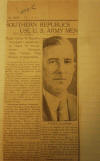
|
August 9, 1925.
Newspaper clipping from the
Baltimore Sun,
"Southern Republics Use U.S. Army Men: Major
Carter to Organize Nicaraguan Constabulary,"
p. 2.
[For
transcription, see immediately above.]
|
|
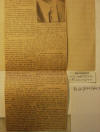
|
August 9, 1925.
Newspaper clipping from the
Baltimore Sun,
"Southern Republics Use U.S. Army Men: Major
Carter to Organize Nicaraguan Constabulary,"
p. 3.
[For transcription,
see above.]
|
|
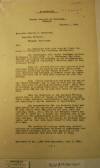
|
October 1, 1925.
Letter from
Major C. B. Carter,
Managua, to US Minister Charles Eberhardt,
Managua, p. 1.
"CONFIDENTIAL ¶
Guardia Nacional de Nicaragua, ¶ Managua. ¶
October 1, 1925. ¶ Honorable Charles C.
Eberhardt, ¶ American Minister, ¶ Managua,
Nicaragua. ¶ Sir: ¶ In compliance with your
request I have the honor to furnish you the
following information. ¶ The undersigned
with Daniel Rodriquez arrived in Managua on
July 16th. L. F. Schroeder, the other
American instructor was awaiting us and we
immediately started the work of organizing a
National Guard of Constabulary Force. ¶ Some
two hundred men had been collected from
different parts of the country and were
living under miserable conditions in the
“Nueva Reforma”. A competent physician was
employed to examine these men physically and
about 80 of them were rejected as unfit for
service. ¶ Very little instruction was given
the men at the “Nueva Reforma”, due to lack
of room and the fact that they were not
getting sufficient food. There were no
kitchens or cooking facilities, and the men
were being given 30¢ per day in cash with
which to buy their food. ¶ Upon the
departure of the American Marines, August
3rd, we moved to “Campo de Marte” and
occupied their former quarters, establishing
a mess the same day and beginning a regular
schedule of instruction. ¶ The appropriation
for the National Guard was C$70,000.00 for
the six months ending December 31st. Of this
amount about C$12,000.00 had been spent for
clothing, shoes, rent, rations and mahogany
boards for the men to sleep on. A budget was
prepared, and it was found that the
appropriation would allow us to enlist only
200 men. We found no difficulty in securing
volunteers, and in fact have been forced to
turn away many good men. ¶ The problem of
training these men, without officers or
noncommissioned officers of experience, has
been heart breaking, and our only salvation
is the excellent material with which we have
to work. ¶ Enclosure to No. 1,806 from
Guatemala, June 3, 1926. . . . "
|
|
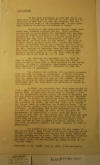
|
October 1, 1925.
Letter from
Major C. B. Carter,
Managua, to US Minister Charles Eberhardt,
Managua, p. 2.
" . . . CONFIDENTIAL
¶ It has been impossible to give any amount
of individual training and we have had to
rely upon the instruction we were able to
give the officers, and the natural
intelligence of the enlisted men. I have
never seen soldiers so willing and anxious
to learn. ¶ Soldiers of the Nicaraguan
regular “army” have never been properly
clothed, fed nor paid; received practically
no instruction; are impressed into service;
and get no medical attention of any value.
In case of emergencies, the usual plan is to
arrest every man of military age they find
on the streets, arm them, get them drunk,
and send them out for action. The idea of
soldiers being properly cared for, trained
and disciplined, is entirely new in this
country, and the result is apparent in this
organization. Young men of some of the best
families of Nicaragua have enlisted for the
three year period, and we have received
requests from numerous parents asking us to
take their sons in the National Guard and
make men out of them. ¶ Our clothing and
equipment is far short of what it should be.
Most of the uniforms are second hand, bought
at some sale of army supplies in the United
States. We have no raincoats, haversacks,
canteens or mess kits, and are absolutely
unprepared to take the field in case of
emergency. ¶ The organic law provides that
we shall cooperate with the army is cases of
emergency. Official requests have been made
in writing and orally for machine guns so
that we might instruct our men in this
branch. We have about 30 rounds of rifle
ammunition per man, although I understand
that the government has millions of rounds
in its arsenals. ¶ It might be contended
that this organization is only a school of
instruction, but since the “bochinche” of
August 28th we have been called upon to
furnish a guard for the president’s house;
patrol the town of Managua, and are now
sending nightly patrols from 7 p.m. till
daylight to assist the police in preserving
order on the outskirts of the town. We have
orders that, incase of an attack on the
fortress “La Loma”, the National Guard is to
assist the forces there in repelling the
attacking force. To do this with our present
arms and ammunition would be almost
suicidal. On September 26th Major Schroeder
with 42 men was sent to Ticuantepe, by order
of the Minister of Government, to
investigate a report from the Chief of
Police of that town to the effect that 300
armed men were congregated there. We divided
the ammunition so that he could have 50
rounds per man, but had this report been
true, and had he been attacked his entire
command would have been in serious danger,
and only because of lack of ammunition. ¶
Our quarters are inadequate for the number
of men we now have. Many of the soldiers are
sleeping on the porches of the barracks, and
during this rainy season are getting soaking
wet at times. There are several buildings
within and adjoining the camp, that could be
used for barracks, which are now occupied by
small groups of the “regular army”. ¶
Enclosure to No. 1,806, June 3, 1926, from
Guatemala. . . . "
|
|
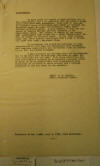
|
October 1, 1925.
Letter from
Major C. B. Carter,
Managua, to US Minister Charles Eberhardt,
Managua, p. 3.
" . . . CONFIDENTIAL
¶ We have tried our utmost to keep politics
out of the organization, and I am confident
that our efforts along these lines have been
successful. From time to time men of
different party affiliations have given us
valuable information regarding plans and
movements within their (former) political
party. A good example of this was the arrest
of General Miranda and five Colonels of the
Chamorrista party. The officer in charge of
the patrol that accomplished this arrest was
a rabid “Chamorrista” before he joined the
National Guard. It has been learned since
that these arrests interfered with a plan to
attack “La Loma” that night, September 24th.
¶ To summarize: the immediate necessity of
this organization is more arms and
ammunition; more barracks; more American
instructors; and sufficient funds to recruit
to our full authorized strength. ¶ I have
stressed our difficulties, not to complain,
but in the hope that through your influence
we might get more facilities for our work.
With these facilities and with the superior
material as to enlisted personnel which we
have, it is my opinion that this
organization will eventually be an honor to
their country and a certain guarantee of law
and order in the republic. ¶ (Sgd) C. B.
Carter, ¶ Chief, National Guard. ¶ Enclosure
to No. 1,806, June 3, 1926, from Guatemala."
|
|
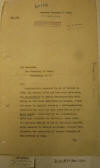
|
November 3,
1925.
Despatch from
US Minister
Charles Eberhardt,
Managua, to Sec. State, Washington, p. 1.
"Managua, November 3,
1925. ¶ No. 67. ¶ The Honorable ¶ The
Secretary of State, ¶ Washington, D. C. ¶
Sir: ¶ Supplementing despatch No. 43 of
October 2, 1925, and comment which has been
made concerning the constabulary in recent
despatches from this office on Political
Conditions in General, I have the honor to
transmit herewith a self-explanatory
communication which has been submitted to me
by Major Carter, instructor of the
constabulary, which will indicate the
conditions under which his men were obliged
to act in the armed fighting which occurred
in Managua on Sunday, October 25th,
following the occupation by General Chamorro
of the fortress La Loma. ¶ The . . . "
|
|
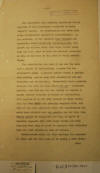
|
November 3,
1925.
Despatch from
US Minister
Charles Eberhardt,
Managua, to Sec. State, Washington, p. 2.
" . . . The
Department will probably experience little
surprise at the disclosures contained in
Major Carter’s report. His organization has
never been given wholehearted support or
encouragement. On the contrary, it has
received such frequent and apparently
well-thought-out discouragements that almost
any officer other than Major Carter would
long ago have asked to have his contract
rescinded as even he has been on the point
of doing several times. ¶ The organization
has been at one and the same time a school
of instruction; a guard for the President’s
home; a special police force; a regular city
patrol; and an army unit expected to act
defensively and offensively. Numerically
their greatest strength has thus far been
about 300 men – increased recently from 250
men for the purpose of forming a secret
service division or bureau of information.
This appears to be the only request of Major
Carter that has been fully and promptly
complied with, but even at its most
efficient stage the organization has never
been allowed even one machine gun nor more
than thirty rounds of ammunition per man, in
spite of repeated requests from both Major
Carter and this Legation that they at least
be equipped with efficient arms for self
defense in case of attack. ¶ Nevertheless
under all this handicap the progress of
these men has been such as to compel a most
wholesome . . . "
|
|
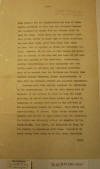
|
November 3,
1925.
Despatch from
US Minister
Charles Eberhardt,
Managua, to Sec. State, Washington, p. 3.
" . . . some respect
for the organization and they of themselves
prevented no less than two attempts (between
the incidents of August 28th and October
25th) to take the Loma. There seems not the
slightest doubt that within thirty to sixty
days of their formation, had they been amply
armed they could have taken La Loma, held it
against an attack and protected the city.
However, to arm them in this manner and
place them in control of the arms and the
Loma did not meet with the approval of the
President. Furthermore, whether
intentionally of with negligence that was
little short of criminal, the President
permitted arms to be removed from the
fortress and finally thus enabled General
Chamorro, almost single-handed, to take over
the fortress without any apparent
resistance. ¶ Chamorro more than anybody
realized the efficiency of the constabulary.
It was for this reason that at daylight of
the morning on which he took the local
garrison, he called both Major Carter and
myself by telephone to inquire what would be
the attitude of the constabulary toward his
forces. This office was non-committal, of
course. Major Carter advised the General
that he had to take orders from the
President. The latter was evidently either
(a) deceived by the Chamorristas, “The
Outs”, (b) dominated by them, or (c) finally
in connivance with them. Otherwise he could
hardly have acted as he did, when, rejecting
¶ their . . . "
|
|
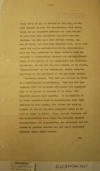
|
November 3,
1925.
Despatch from
US Minister
Charles Eberhardt,
Managua, to Sec. State, Washington, p. 4.
" . . . their offer
of aid in defense of the city, he not only
refused to give the constabulary arms
sufficient for an offensive movement but
also refused to give them arms sufficient
for their own protection. He even gave them
several orders, any one of which, had they
been complied with, would have meant the
entire annihilation of the organization.
This was only prevented by Major Carter’s
long experience in constabulary matters and
his magnificent grasp of all phases of the
complicated and difficult situation. He and
his men were indeed, as he states,
“step-children” of the Government, barely
escaping sacrifice to the ambitions of the
political leader. ¶ Logically enough, “The
Ins” are usually in favor of a well-trained
constabulary. Such was the case recently
with the liberals who wanted the
constabulary to be placed in command of La
Loma. The Chamorro element were opposed. It
is doubtful if in these countries such an
organization free from politics is ever
wanted, but rather one made up largely of
men of the same political faith as is held
by those in power. Thus, General Chamorro
and the conservatives as a whole who
formerly opposed strengthening the
organization now recommend its increase by
several hundred men and their continued
training under Major Carter. ¶ For . . . "
|
|
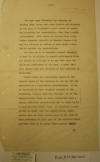
|
November 3,
1925.
Despatch from
US Minister
Charles Eberhardt,
Managua, to Sec. State, Washington, p. 5.
" . . . For some days
following the fighting of October 25th,
there were open threats and attempts on the
part of Chamorro’s armed rabble to ambush
and slaughter the constabulary, whom they
greatly outnumbered. This became so serious
that Major Carter appealed directly to
General Chamorro to end the suspense by
taking an open stand either for or against
the constabulary. ¶ Now that he is in
command, General Chamorro is said to be
willing to permit enlistments without regard
to what may be or may have been the
political preference of the men. A great
deal will depend upon his attitude in this
question of personnel. ¶ Major Carter has
repeatedly spoken in the highest terms of
the material he has had for the formation of
a first-class constabulary. If he is
permitted to have complete control of the
personnel, keeping politics strictly out of
the organization, there is every indication
that a highly efficient constabulary can be
built up in a comparatively short time. If
politics is permitted to enter into the
organization, Major Carter sees no other
course open to him than to take advantage of
that part of his contract which provides
that he be given three months’ salary ¶ in .
. . "
|
|
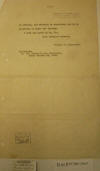
|
November 3,
1925.
Despatch from
US Minister
Charles Eberhardt,
Managua, to Sec. State, Washington, p. 6.
" . . . in advance,
his contract be rescinded, and he be
permitted to leave the country. ¶ I have the
honor to be, Sir, ¶ Your obedient servant, ¶
Charles C. Eberhardt. ¶ Enclosures: 1. Mr.
Carter to Mr. Eberhardt, dated October 28,
1925."
|
|
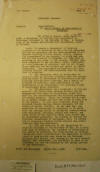
|
May 6, 1926.
Establishment of Department of Aviation in
Nicaragua, report by
H. M. Gwynn,
US Military Attache, Guatemala, p. 1.
"G-2 report. ¶ 6100.
¶ NICARAGUA (Combat) ¶ Subject:
Organization. ¶ (a) Establishment of
Department of Aviation. ¶ By official
decree, dated March 13, 1926, a Department
of Aviation was established in Nicaragua,
attached to the Ministry of War. A
translation of the decree authorizing this
department, reads as follows: ¶ ***1. To
create a Department of Aviation attached to
the Ministry of War with the employees who
may be necessary for the administration of
all matters relating to this branch, and to
promote its improvement in the country; to
study and submit for the approval of
Congress all such laws of aviation as may
apply to the country, whether they have
reference to the military, civil, commercial
or other branches of aviation, and for all
things which make for the betterment and
safety of aerial navigation. The Department
of Aviation will have complete control and
administration over all branches of
aviation. ¶ 2. The executive power is
authorized to create a body of military
aviation with its corresponding fleet of
aeroplanes in accordance with the existing
international treaties, and a school of
aviation in addition, with instructors of
any nationality to be determined, for
training a body of Nicaraguan pilot
aviators. ¶ 3. The Government will
construct, on its own account, two
first-class landing fields, one in Managua
and the other in Bluefields, which will have
all the accommodations and fittings
necessary for aerial service. These two
landing fields must be in square blocks and
have 800 varas on each side of the square.
It will also construct along the proposed
routes landing fields necessary for the
safety of aerial traffic. In the same way,
the executive is authorized to construct at
an early date the landing fields to
establish communication with Matagalpa,
Jinotega, Estelí and Ocotal, and other parts
of the republic where such fields may be
considered necessary. No company or private
individual, Nicaraguan or foreigner, will be
permitted to construct landing fields
without due authorization from the
executive. ¶ 4. For the creation of the
Department of Aviation attached to the
Ministry of War, of a military body of
aviation, the purchase of aeroplanes of the
school of aviation, the construction of
landing fields and other expenditures; the
Executive is authorized to appropriate such
funds as the National Treasury will permit,
and placing in the next General Budget, well
specified, the sum which is seen to be
necessary for the maintenance of the aerial
service of the Government. ¶ From: M/A
Guatemala ¶ Report No. 1,750 ¶ 5/6/1926. . .
. "
|
|
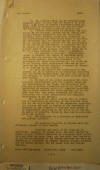
|
May 6, 1926.
Establishment of Department of Aviation in
Nicaragua, report by
H. M. Gwynn,
US Military Attache, Guatemala, p. 2.
" . . . G-2 report. ¶
6100. ¶ 5. The landing fields may be
constructed on national lands, in case such
are found to be suitable, or on lands of
private individuals under expropriation in
accordance with the law for which the
Government is given authority by this law. ¶
6. Private individuals or companies may
construct on the national landing fields,
having previously secured permission from
the respective Ministry, their hangars,
submitting themselves to the samevigilance
[same vigilance] and supervision which is
provided. The Government will not charge any
tax for the use of its landing fields;
neither for the construction of the hangars
of individuals or companies who will be
subject to the taxes of the present law and
the general laws of the country, and those
which may be in the future dictated with
respect to aviation. ¶ 7. All persons or
companies, whether Nicaraguan or foreign,
who desire to introduce aeroplanes into the
country for their private use or for public
service, must ask permission of the
government for their introduction and for
their use in the country until appropriate
laws may be dictated by the National
Congress to govern all branches of aviation
in the country. ¶ 8. From the date of the
publication of the present law in La Gaceta,
it is absolutely forbidden that any aerial
machine shall fly over the cities of the
republic, at less than 2,000 feet altitude
above such cities. ¶ 9. In view of the
urgent necessity for establishing
communication with the Atlantic Coast and
the departments of the North, the Government
will aid with a monthly subvention during
two years, any individual or company which
will consider establishing an aerial service
for these regions, and at the same time will
lend every pecuniary aid and all facilities
for proper installation and efficient
maintenance of the service. ¶ 10. No
graduate pilot aviator will be permitted to
manipulate an airplane in the republic
without the due authorization of the
respective ministry. All persons who wish to
engage in the profession of aviation in any
branches of aviation must submit to an
examination according to the rules of the
national school of aviation, which by this
law is established in the capital. ¶ 11. The
Executive is authorized to administer the
present law.**** ¶ The American Legation in
Managua made the following comment on this
decree: ¶ “Aviation has made little progress
in Nicaragua. Managua, an inland city, has
been visited by planes on such limited
occasions as aeroplanes have passed this way
from the Canal Zone, and the visit last
September of the two hydroplanes of the
German aviators who were endeavoring to
establish an airmail service between
Colombia and the United States, via the
Canal Zone and Central America. ¶ From: M/A
Guatemala ¶ Report No. 1,750 ¶ 5/6/1926. . .
. "
|
|
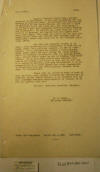
|
May 6, 1926.
Establishment of Department of Aviation in
Nicaragua, US
Military Attache
H. M. Gwynn,
Guatemala, p. 3.
" . . . G-2 report. ¶
6100. ¶ General Humberto Pasos Diaz, present
Minister of Government, is the only
Nicaraguan who has engaged in aviation here.
He received his instruction in aviation in
the United States, and brought a plane to
Nicaragua about two years ago, his idea
being to establish a mail and passenger
service between Managua and Bluefields. He
piloted the plan from the port of Corinto to
Managua, but beyond this no flights have
been undertaken. The plane was stored by the
last administration under the pretext that
bombing might be undertaken, Pasos Diaz
being one of the opposite political party. ¶
Now that the Chamorro regime is in power,
this agitation for a Department of Aviation
is being taken, as a military measure, if
for no other reason. It is realized how
easily a revolutionary party might take (and
hold during the rainy season, about to
commence) Bluefields with its Customs House,
etc., unless resort might be had to bombing
from aeroplanes. It is said that orders have
already been placed for planes, and rumor is
that one or more has been landed at Corinto,
but this is believed to be an exaggeration
or a rumor spread for local consumption in
connection with any revolutionary movement
which might be contemplated. ¶ Pasos Diaz is
doubtless back of much of this activity,
and, having received his instruction in
aviation in the United States, it is
believed that he will approach American
manufacturers of planes, if he has not
already done so.” ¶ Source: American
Legation, Managua. ¶ H. M. Gwynn, ¶ Military
Attaché. ¶ From: M/A Guatemala ¶ Report No.
1,750 ¶ 5/6/1926."
|
|
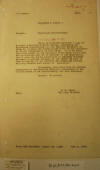
|
June 3, 1926.
Report on Nicaraguan Constabulary,
US Military Attaché
H. M. Gwynn, Guatemala, p. 1.
"G-2 report. ¶ 6010.
¶ NICARAGUA (Combat) ¶ Subject: Nicaraguan
Constabulary. ¶ There is forwarded herewith
a copy of a report submitted by Major
Carter, commanding the Nicaraguan
Constabulary, to the American Minister, in
which he outlines the difficulties which he
has encountered in his organization of that
force. It is believed that this report of
the obstacles which Major Carter has had to
overcome will be of interest to the
Department, and of possible future
assistance to American officers assigned on
similar details, as the report is more or
less indicative of the difficulties which
any foreign military mission must expect to
encounter. ¶ Statements, extracted from the
monthly dispatches of the American Minister,
pertaining to the effectiveness of the
Constabulary, are also enclosed. ¶ Source:
As stated. ¶ H. M. Gwynn, ¶ Military
Attaché. ¶ Encl. ¶ From: M/A Guatemala ¶
Report No. 1,806 ¶ June 3, 1926. . . . "
[NOTE:
For Major Carter's report, see above, Oct.
1, 1925]
|
|
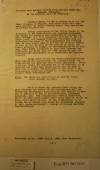
|
June 3, 1926.
Report on Nicaraguan Constabulary,
US Military Attaché
H. M. Gwynn, Guatemala, p. 2.
" . . . EXTRACTS FROM
MONTHLY REPORTS FROM AMERICAN MINISTER, ¶
MANAGUA, NICARAGUA, ¶ ON THE NATIONAL GUARD
OF NICARAGUA. ¶ ***There seems not the
slightest doubt but for their presence in
Managua, much blood would have been shed and
with the almost certain result that
revolution would have followed.*** ¶ ***The
cooperation of the United States in the
formation of the Constabulary was accepted
grudgingly and delays and evasions were
persistently indulged in. This attitude in a
less pronounced form may be said to exist
today, not because President Solorzano does
not appreciate the value of the organization
and realizes that he must depend upon it for
his own personal safety as well as for the
good of the country at large, but almost
entirely on account of representations of an
element which hopes ultimately to gain from
disorder and revolution and which does not
look favorably upon the formation and
maintenance of so formidable an
organization.*** ¶ ***In spite of all the
discouragements which Major Carter has
encountered, the progress which the
Constabulary has made has been really
phenomenal. While continued delays and
evasions are to be expected, it is believed
and hoped that Major Carter will be able to
give such practical demonstration of the
value of the organization under his command
as to win in the end the support ofthe [of
the] Government.*** ¶ Note: The above was
extracted from monthly report dated October
2, 1925. ¶ ***It is hoped and expected that
within the next few weeks the status of the
constabulary will be definitely determined,
particularly with respect to what may be
expected in way of appropriations, increased
personnel, etc. The organization remains
separated, about one half their number still
being kept on detail in Leon, under Major
Carter. If the organization is to become the
efficient body which was originally planned,
it will become necessary to employ
additional American instructors.*** ¶
Enclosure to No. 1,806 ¶ June 3, 1926, from
Guatemala."
|
|
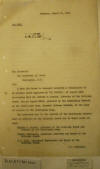
|
August 26, 1926.
Despatch from
US Charge
D'Affaires Lawrence Dennis,
Managua, to Sec. State, Washington, p. 1.
"Managua, August 26,
1926. ¶ No. 264. ¶ The Honorable ¶ The
Secretary of State, ¶ Washington, D.C. ¶
Sir: ¶ I have the honor to transmit herewith
a translation of an article which appeared
in “LA PRENSA”, of August 25th, announcing
that Mr. Calvin B. Carter, Director of the
National Guard, was, on August 24th,
promoted by the Commanding General of the
Nicaraguan army, General Alfonso Estrada, to
the rank of Colonel in the Nicaraguan army.
¶ The Americans now in the service of the
Nicaraguan Government as officers of the
National Guard are in their order of rank: ¶
Calvin B. Carter, Director of the National
Guard and Colonel of the Nicaraguan army. ¶
Daniel Rodriguez, Assistant Director and
Major of the National Guard. ¶ L.J. Clay,
Assistant Instructor and Major of the
National Guard. ¶ J.L. Rutledge, . . . "
|
|
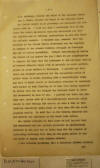
|
August 26, 1926.
Despatch from
US Charge
D'Affaires Lawrence Dennis,
Managua, to Sec. State, Washington, p. 2.
" . . . J. L.
Rutledge, Aviator and Major of the National
Guard. ¶ Lee J. Mason, Aviator and Major of
the National Guard. ¶ Mr. Carter called on
me yesterday and discussed the situation
with me. I told him that I understood that
he was under the orders of General Chamorro
absolutely and that the Legation had no
official instructions to give him about his
official conduct. I reminded him, however,
that the attitude of the United States
Government and the Legation in respect of
the present internal struggle in Nicaragua
was one of strict neutrality. Without
undertaking to define the nature of his
duties for him I felt it not inappropriate
to express the hope that the Americans in
the military service of General Chamorro
might find it possible to avoid
participation in armed warfare in Nicaragua.
I pointed out that there was abundant
precedent for the non-participation of
police corps in actual fighting with a
revolutionary enemy and that it might create
an unpleasant situation if Americans were
killed in such fighting or if they were
merely captured. He stated that the law
obliged the National Guard to serve the
Government in case of war. I pointed out
there was perhaps more police work of a
non-belligerent character which should be
done through the country at such a time as
this than his relatively small corps of less
than 400 men could properly handle. He said
that so far General Chamorro had not ordered
the Americans in the Guard into action. ¶
Mr. Carter informed me that since he had
learned that the Government had had certain
prisoners in penitentiary tortured in the
past two or three days for the purpose of
extracting testimony from them, he had given
orders to his men never to employ such
inhuman methods. ¶ I was informed yesterday
that a reputable Liberal attorney ¶ and . .
. "
|
|
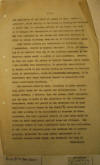
|
August 26, 1926.
Despatch from
US Charge
D'Affaires Lawrence Dennis,
Managua, to Sec. State, Washington, p. 3.
" . . . and
Magistrate of the Court of Appeal of Leon,
Doctor P. Solomayor, while staying in the
hotel at Corinto, was arrested by Major
Clay, an American officer of the Guard, and
sent up to Managua for examination at the
penitentiary where he has been suspended by
the thumbs and otherwise tortured in order
to obtain testimony from him as to
revolutionary plans. ¶ Such brutal methods
are traditional in Nicaragua and, I
understand, ordered by General Chamorro. It
is, of course, not to be inferred that any
of the American personnel of the Chamorro
regime would be guilty of such practices.
However, as they are under the orders of
General Chamorro whose regime, I can testify
from observation, is generally characterized
by abuses which in any country having an
American or European level of civilization,
would be considered outrageous, it is
inevitable that these Americans should be
associated with these unfortunate practices.
¶ The American aviators have, according to
press reports, been given bombs for use
against the revolutionists. It is fairly
evident, I believe, that the planes, their
equipment, and the type of bombs in the
possession of the Nicaraguan Government,
would not permit of the effective use of
such explosives against troops in the field,
and as revolutionists are very unlikely to
be encountered in barracks in these
countries, the only apparent utility of such
bombs would be found in their employment
against towns and villages. The principal
result of such bombardment would be the
destruction of the lives of innocent women
and children and of private property,
precisely the only aerial achievement of an
American aviator named Brown, who bombarded
the town of ¶ Tegucigalpa . . . "
|
|
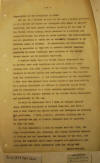
|
August 26, 1926.
Despatch from
US Charge
D'Affaires Lawrence Dennis,
Managua, to Sec. State, Washington, p. 4.
" . . . Tegucigalpa
in the revolution of 1924. ¶ For me, as I
believe it will be for most American
citizens, it is a matter of regret not
unmingled with shame to observe Americans,
who have gained military training in the
army of the United States lending their
services to a military and unconstitutional
despotism in Latin America, the
administration and war practices of which
are so evidently repugnant to an American
sense of decency. If Governments and
revolutions must be conducted as they are in
certain Central American countries it seems
desirable that citizens of the United States
should not be involved therewith. ¶ I
realize fully that the United States
Government has no control over such
Americans and cannot prohibit their serving
whom they will outside of the United States.
However, inasmuch as Messrs Carter and
Rodriguez came to this country with the
introduction, if not recommendation of the
Department, I feel that the present case
should indicate the desirability of a policy
whereunder no officer or military expert
would ever be recommended to a Latin
American Government unless he were in the
regular service of the United States
Government and preferably in its pay. ¶ It
will be understood that I make no charges
against these American employees of General
Chamorro, and that I have a high regard for
Messrs Carter and Rodriguez as officers and
gentlemen. I feel, however, American
military men in the service and pay of
General Chamorro must be expected to play
his game. ¶ In this connection I wish to
report that Mr. Hill, the High Commissioner,
Mr. Lindberg, the Deputy Collector General
of Customs and Mr. Rosenthall, the Manager
of the Bank, are giving the Legation their
loyal support and cooperation and have
manifested their solidarity with the policy
and ¶ administration . . . "
|
|
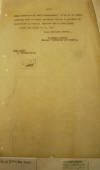
|
August 26, 1926.
Despatch from
US Charge
D'Affaires Lawrence Dennis,
Managua, to Sec. State, Washington, p. 5.
" . . .
administration of their Government. It is to
be noted, however, none of these gentlemen
are in a position of dependence on General
Chamorro for a livelihood. ¶ I have the
honor to be, Sir, ¶ Your obedient servant, ¶
LAWRENCE DENNIS, ¶ Charge D’Affaires ad
interim. ¶ Enclosure: ¶ 1/ Translation. . .
. "
|
|
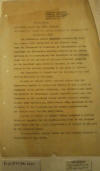
|
August 26, 1926.
Despatch from
US Charge
D'Affaires Lawrence Dennis,
Managua, to Sec. State, Washington, p. 6.
Enclosure: "Mr. Calvin B. Carter Was Raised
Yesterday to Colonel of the Nicaraguan
Army," translation of article in La
Prensa, Managua, August 25, 1926.
" . . . American Legation ¶ Managua,
Nicaragua. ¶ Despatch No. 264 ¶ Enclosure
No. 1 ¶ TRANSLATION. ¶ La Prensa, August 25,
1926. Managua. ¶ MR. CALVIN B. CARTER WAS
RAISED YESTERDAY TO COLONEL OF THE
NICARAGUAN ARMY. ¶ The Commanding General
announced yesterday to Major Mr. Carter,
Chief Instructor of the National Guard that
the Government of Nicaragua, in
consideration of the important and
efficacious services rendered by Mr. Carter,
not only in the organization and discipline
of the National Guard but in the services of
national vigilance committed to the
important corps which he commands, he was
being raised in the military hierarchy to
the grade of Colonel. ¶ The commission of
Colonel and the insignia of his rank will be
delivered to him today. ¶ As soon as Colonel
Carter received notice from the Commanding
General he invited his friends to take a
glass of champagne in his private residence.
The following took part, the Minister of
Government, General Humberto Pasos Diaz, the
Secretary of the President Doctor Horacio
Arguello Bolaños, Doctor Ramón Castillo C.,
Señor Manuel Doña, assistant to the
Secretary of the President and the Prensa
representatives don Enrique Belli and don
Gabry Rivas. ¶ A group of friends of Colonel
Carter, prepared a manifestation of sympathy
for the distinguished chief of the National
Guard whose rise has a high signification of
justice on the part of the Executive Power.
¶ We congratulate Colonel Carter for this
merited evidence of recognition of his
merits."
|
|
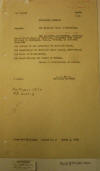
|
March 4, 1927.
Report on the National Guard of Nicaragua,
US Military Attaché
A. W. Bloor, p. 1.
"G-2 report ¶ 6010 ¶
NICARAGUA (Combat) ¶ Subject: The National
Guard of Nicaragua. ¶ The following
information, covering the National Guard of
Nicaragua, furnished this office by Major D.
Rodriguez, U.S.A., retired, is enclosed
herewith: ¶ (a) Extract of law governing the
National Guard. ¶ (b) Regulations for
National Guard School, abbreviated. ¶ (c)
Table of Organization. ¶ (d) Short History
and Record of Events. ¶ Source of
information: As stated. ¶ A. W. Bloor, ¶
Military Attaché. ¶ 4 encls. ¶ From: M/A
Nicaragua ¶ Report No. 5 ¶ March 4, 1927. .
. . "
|
|
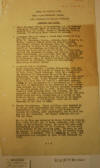
|
March 4, 1927.
Report on the National Guard of Nicaragua,
US Military Attaché
A. W. Bloor, p. 2.
Enclosure:
"Table of Organization, Nicaraguan National
Guard. (All Included in Budget 1926-27)", p.
1.
" . . . TABLE OF
ORGANIZATION ¶ Nicaraguan National Guard. ¶
(All Included in Budget 1926-27) ¶ COMMAND
AND STAFF ¶ Chief Director School of
Instruction, as per contract with Major
Carter, Chief of National Guard (contract
expires June 30, 1927). Major D. Rodriguez,
U.S.A., retired, discharging these duties at
present. ¶ Assistant Chief Director –
Exercising duties of G-1, G-2, G-3 and G-4.
¶ Major D. Rodriguez, U.S.A., retired, under
Major C. B. Carter, serving without contract
with Nicaraguan Government, arrived in
Managua July 16, 1925. By resignation of
Major C. B. Carter, became Chief of the
School of Instruction, on February 5, 1927.
¶ Request has been made by the President of
Nicaragua, through the American Legation,
and through same to the State Department,
for authority from the Secretary of War,
under Act of Congress, May 21, 1926, for
Major D. Rodriguez, Rtd., to accept position
with Nicaraguan Government as Director,
School of Instruction, Nicaraguan National
Guard. ¶ Assistant Chief Director. ¶ Major
Benjamin Vargas, a native Nicaraguan, with
the rank of Colonel, and lately of General,
was appointed to this place, about February,
1925, by a decree of the Minister of
Government to replace Mr. L. F. Schroeder,
who was discharged from duty with the guard
in November, 1925. Major Vargas’ functions
with the Guard have been more or less of a
political nature, though he was in command
of a detachment of 220 that was sent to
Bluefields at the outbreak of the revolution
against the regime of General Emiliano
Chamorro, on the east coast, May 3, 1926.
Major Vargas is not familiar with American
drill and tactics. He was assigned to duty
as Commanding Officer of the Aviation Field
which has been functioning as a branch of
the National Guard. Actually Major Vargas is
in command of a detachment of 105 National
Guard men at Fort Acosasco in the city of
Léon. ¶ Junior Instructors. These positions
were supposed to be filled with instructors
who could give practical instruction and who
would have a good knowledge of Spanish to
lecture, give conferences, and be with the
men for all purposes. The budget provides
$800.00 for the four. ¶ Mr. L. J. Clay was
selected by Major Carter in September, 1926,
to fill one of these positions, with rank of
Major in the National Guard. He could not
give much instruction on account of the
language, and his very short service in the
American army. However, he was in command of
a detachment of 60 men in Corinto since the
middle of October, 1926 to January 5, 1927.
His resignation was accepted to take effect
February 28, 1927. . . . "
|
|
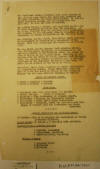
|
March 4, 1927.
Report on the National Guard of Nicaragua,
US Military Attaché
A. W. Bloor, p. 3.
Enclosures:
"Table of Organization, Nicaraguan National
Guard. (All Included in Budget 1926-27)", p.
2, and "Force Composing the National Guard,"
p. 1.
" . . . Mr. Guillermo
Arana, a native, with short service in the
American army during the emergency, occupied
one of these positions for about three
months. He did not prove competent enough,
and his resignation was accepted. He held
the rank of Captain. ¶ Mr. Adolfo Vargas, a
native, was appointed to fill one of these
vacancies by letter from the executive. As
he is not familiar with the American drill
regulations and tactics, he was assigned,
also by direction of the Executive, to
second in command of the Aviation Field. ¶
Mr. Rutledge and Mr. Durel, also filled
these positions as instructors of aviation
of a detachment of the Guard. Both were
discharged the beginning of January, 1927. ¶
Mr. Lee Mason and Mr. Brooks, both aviation
pilots, were filling these positions, as
instructors in the aviation section of the
National Guard, and given the rank of Majors
in the organization. However, by conference
with the Chief of Staff, General José
Solorzano Diaz, the aviation section
hereafter will be directly dependent of the
Commander in Chief of the Army, and under
direct control of the Chief of Staff. ¶
Therefore, these four positions of Junior
Instructors are practically vacant. Major
Rodriguez estimates that at least two could
be filled by men living in Managua who had
some military training at school. ¶ CHIEF
DIRECTOR’S STAFF. ¶ 1 Guard – Adjutant –
Captain ¶ 1 Medical Officer – Captain ¶
Civilians ¶ 1 Secretary and Asst. Accountant
for Supply. ¶ 1 Dental Surgeon (Rank of
Captain) ¶ 1 Chaplain – Also instructor in
primary school. ¶ 1 Instructor – Primary and
Elementary School. ¶ 1 Instructor – Civil
Law & Civic Government. ¶ 1 Instructor –
Criminal, Penal and International Law. ¶
Note: At present only one instructor for
these subjects. ¶ FORCES COMPRISING THE
NATIONAL GUARD ¶ 23 Cadets – Men to be
trained and instructed as future permanent
Officers. ¶ CADET CORPS: 23 Cadets – 6
detailed with aviation. ¶ HEADQUARTERS &
SERVICE COMPANY ¶ 1 Captain, temporary ¶ 1
Lieutenant, temporary ¶ 1 Sub-Lieutenant,
temporary ¶ Office Section ¶ 1 Sergeant
Major ¶ 2 Corporals ¶ 2 Privates . . . "
|
|
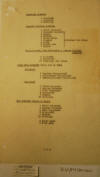
|
March 4, 1927.
Report on the National Guard of Nicaragua,
US Military Attaché
A. W. Bloor, p. 4.
Enclosure: "Force
Composing the National Guard," p. 2.
" . . . Hospital
Section ¶ 1 Sergeant ¶ 1 Corporal ¶ 4
Privates ¶ General Service Section ¶ 1 First
Sergeant ¶ 1 Sergeant mechanic ¶ 3 Bakers
)[Privates 1st class] ¶ 2 Barbers )[Privates
1st class] ¶ 1 Electrician )[Privates 1st
class] ¶ 1 Plumber )Privates 1st class ¶ 4
Cooks )[Privates 1st class] ¶ 3 Stable men
)[Privates 1st class] ¶ 1 Bugler )[Privates
1st class] ¶ Intelligence, Investigation &
Secret Service Section. ¶ 1 Sergeant ¶ 3
Corporals ¶ 17 Privates, 1st class ¶ EACH
LINE COMPANY (from 1st to 6th) ¶ Officers ¶
1 Captain (temporary) ¶ 1 Lieutenant
(temporary) ¶ 1 Sub-Lieutenant (temporary) ¶
Enlisted ¶ 1 First Sergeant ¶ 1 Supply
Sergeant ¶ 2 Line Sergeants ¶ 6 Corporals ¶
1 Bugler ¶ 38 Privates ¶ 7th COMPANY
(Machine Guns) ¶ 1 First Sergeant ¶ 1 Supply
Sergeant ¶ 2 Line Sergeants ¶ 6 Corporals ¶
1 Bugler ¶ 38 Privates ¶ 2 Lewis guns ¶ 2
Colt guns . . . "
|
|
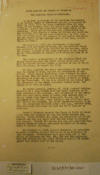
|
March 4, 1927.
Report on the National Guard of Nicaragua,
US Military Attaché
A. W. Bloor, p. 5.
Enclosure:
"Short History and Record of Events of the
National Guard of Nicaragua," by Major
Daniel Rodriguez, p. 1.
"SHORT HISTORY AND
RECORD OF EVENTS OF THE NATIONAL GUARD OF
NICARAGUA. ¶ On arrival at Managua of the
American Instructors C. B. Carter, Louis F.
Schroeder and the undersigned on July 15,
1925, there had been recruited from all
sections of the country about two hundred
and eighty men. A medical officer was
contractor for examination of the recruits.
About 50% of the men were disqualified for
the service, and finally a force of 200 men
was enrolled. Four companies of 50 men were
organized. At this time the new organization
was camping in one lumber and coffee
cleaning mill, in the western part of the
town, called “Nueva Reforma”. ¶ On August 3,
1925, the detachment of American Marines
left the Campo de Marte, and the National
Guard was quartered in the place vacated by
the Marines, while the eastern section of
the camp continued to be occupied by the
“Comandancias de Armas”, or National of from
50 to 100 men. ¶ The regular organization of
the Training School was barely beginning
when the first attack on La Loma was made by
General Alfredo Rivas, a brother in law of
President Solorzano, on August 28, 1925. ¶
On this occasion the Guard was ordered by
the President to remain in camp, and not to
participate in any affair. Quasi normal
conditions were restored in about two weeks;
then the Guard was called to perform duties
of patrolling at night and perform service
as Guard of Honor for the President. It has
been stated by one leader that the alertness
of the Guard prevented eleven times the
taking of La Loma at night. ¶ On Sunday
morning, October 28, 1925, General Emiliano
Chamorro by a coup d’etat took the small
fortress of La Loma commanding the capital.
One detachment of the Guard that was
performing guard of honor duty engaged into
a street fight with General Chamorro’s
troops, and two guardsmen were killed. Some
soldiers and civilians were also killed and
wounded, the total casualties being 15 or
17. The situation was held until 9:30 a.m.,
October 29th, when President Solorzano
ordered the Guard outpost to withdraw. ¶
General Chamorro entered the Campo de Marte
at about 11:00 a.m. and praised the men for
their conduct and morale. About October 30,
1925, the mustering out of all members who
did not agree with the new order of affairs
was ordered. Nearly 100 cadets and men were
mustered out. General Chamorro became
commander in chief of the Army, under
President Solorzano. ¶ On November 1, 1925,
General Chamorro, as commander in chief
verbally ordered the Guard to be recruited
to full strength. Enlistments were plentiful
and by the middle of December the 4th, 5th,
6th and 7th companies were 75% filled and
the small fortress called “El Hormiguero”
was turned over to the Guard. . . . "
|
|
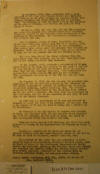
|
March 4, 1927.
Report on the National Guard of Nicaragua,
US Military Attaché
A. W. Bloor, p. 6.
Enclosure:
"Short History and Record of Events of the
National Guard of Nicaragua," by Major
Daniel Rodriguez, p. 2.
" . . . In November,
1925, three companies with a total strength
of 140, and under Majors Carter and
Schroeder were ordered to the city of Leon
and remained there, preserving quietness and
order until the end of January, 1926. On
February 1, 1926 the Guard took up the
policing of the city of Managua, one hundred
men going on duty every 24 hours. ¶ On May
4, 1926, the 1st, 2nd, 3rd and 4th companies
and other detachments were ordered under
Major Benjamin Vargas to proceed to the
Atlantic Coast on account of the outbreak in
that section. The detachment consisted of
223 officers and men. ¶ The detachment
fought at Rama, Bluefields and the Bluff,
and during the period from May 20 to August,
1926, there were a total of 29 casualties in
the detachment. Also during this period
small detachments were returned to Managua.
Until the end of December, 1926, there
remained 60 men, and at the present six men
are serving there. ¶ Not less than 50% of
the force returned from the east coast sick
with malaria, and to this date some have not
as yet fully recovered from sickness. ¶ At
the August, 1926, outbreak a detachment of
60 men, under Major L. J. Clay, was ordered
to the port of Corinto to take charge of the
city and harbor, guard the government pier
and the railroad terminal. This detachment
remained there until January 8th when it was
relieved. This detachment was made up of the
6th Co. and men from the 5th. ¶ On December
7, 1925, the 2nd company and attached men,
numbering 58 was ordered for service up the
“Sierras” in the coffee district to protect
the picking and gathering, to prevent
gambling, coffee stealing, etc. The service
rendered in this connection by the guard has
been praised by all the coffee growers. The
same duty was performed in the 1926 crop,
but due to the scarcity of men only 10 were
sent to the coffee district. ¶ On February 1
a detachment of 60 men was ordered to
Granada to guard the Fort of La Polvora. At
the same time a detachment of 50 men was
sent to Leon, and a further one to
Chinandega. ¶ On February 8 the detachment
at Granada was ordered to Leon, and together
with the one already there occupied the fort
of Acosasco, in the city of Leon, the total
of this detachment being 105 officers and
men. ¶ Leon now being occupied by Marines,
the Guard has been ordered to return to its
headquarters in Managua on March 2, 1927. ¶
Twenty one members of the National Guard are
at present serving with the expeditionary
forces of the National army as aids to
officers, machine gunners, etc. ¶ In
addition to the above the men remaining at
headquarters have been performing duties of
various kinds, such as Guard of Honor to the
President; Congressional Guard; escort for
funerals; guarding the railroad shops and
stores; the aviation and landing field; the
central liquor distillery plant; guarding
prisoners of the penitentiary in clearing
aviation field, and numerous other duties. ¶
(Sgd.) Daniel Rodriguez, Maj. USA, Ret’d. In
charge of Nic. National Guard."
|
|
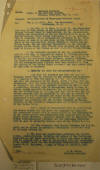
|
May 23, 1927.
Reorganization of Nicaraguan National Guard,
US
Military Attaché A. W. Bloor, p. 1.
"No. 50. ¶ American
Legation, ¶ Office of the Military Attaché,
¶ Managua, Nicaragua, May 23, 1927. ¶
Subject: Reorganization of Nicaraguan
National Guard. ¶ To: The A. C. of S., G-2,
War Department, Washington, D. C. ¶ 1. Lt.
Col. R. Y. Rhea, U. S. M. C., was designated
last week to take charge of and reorganize
and train the Nicaraguan National Guard or
Constabulary. As the organization, training
and instruction of the new Constabulary is
to be under the Marines, Major Daniel
Rodriguez, U. S. A., retired, will be
relieved, and he contemplates returning to
the United States as soon as he can close up
the administrative affairs of the
organization. Majors William C. Brooks and
Lee Joseph Mason, the two American
Instructors in the Aviation Section of the
Guard, have already been relieved and both
expect to return to the States on next
available transportation. ¶ 2. The enlisted
strength of the new organization will be
1500 men. An appropriate number of officers
and noncommissioned officers will be
furnished from the U. S. M. C. to provide
the necessary staff officers, company
officers, and commissioned and
noncommissioned instructors. Five officers
and six noncommissioned officers have been
detailed to form the nucleus of the Marine
Corps personnel and this number will be
increased as required. ¶ 3. Briefly the plan
for reorganization is:- ¶ (a) That 100
selected men from the present National Guard
will be retained in the service and
organized as a company to form the nucleus
for the new Constabulary and that the
remainder of the Guard, about 190 men, will
be discharged; that the above mentioned
company of 100 men will be organized and
ready to commence training by June 1; that a
recruiting campaign will be inaugurated
early in June to obtain enough recruits to
increase the enlisted strength of the new
Constabulary to 392 men; and that thereafter
the enlisted strength will be recruited to
1500 men as rapidly as suitable men can be
obtained and funds of the Nicaraguan
Government become available to provide for
their pay, subsistence and equipment and the
expense incident to the employment of the
necessary commissioned and enlisted
personnel of the Marine Corps. ¶ (b) A
School of Instruction will be established
for Native Cadets and all those who
successfully complete the prescribed course
will be commissioned in the Constabulary in
the junior grades and eventually will
replace most of the Marine Corps Officers.
Likewise schools will be conducted for
Native Noncommissioned officers and the
graduates therefrom will be used to
gradually replace most of the Marine
N.C.O[.]s. ¶ (c) The principle that Marine
Officers and N.C.O[.]s shall not be placed
in positions subordinate to natives will be
strictly adhered to. ¶ 4. The laws and
regulations governing the organization,
administration, training and duties of the
Philippine Constabulary and those pertaining
to Haiti and other countries will be studied
with a view to prescribing laws and
regulations along similar lines for the
Nicaraguan Constabulary, meanwhile Decree
No.28, Nic.Govt., a copy of which is
attached, will govern. ¶ 1 Incl. ¶ Source:
Lt. Col. R.Y. Rhea. ¶ A. W. Bloor, ¶
Military Attaché. . . . "
|
|
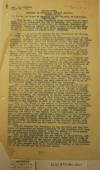
|
May 23, 1927.
Reorganization of Nicaraguan National Guard,
US
Military Attaché A. W. Bloor, p. 2.
" . . . Incl. to
Accompany ¶ Report No. 50. ¶ SENATE HOUSE, ¶
Republic of Nicaragua, Central America. ¶
Decree No.28. ¶ The Senate and House of
Deputies of the Republic of Nicaragua, ¶
CONSIDERING; ¶ That by Art. 2 of the
Convention about Limitation of armaments
held in Washington the 7th of February 1923,
between the Republics of Nicaragua,
Costa-Rica, El Salvador, Honduras and
Guatemala, Nicaragua agreed- as well as
other high contracting- to create a National
Guard that would co-operate with the Army in
the preservation of public order; RESOLVED:
¶ Art. 1. It is hereby created by the
Government the National Guard to which said
convention refers. ¶ Art. 2. The National
Guard is an institution absent of all
political influence and destined to maintain
order with the triple character of urban,
rural and judicial police. The Army is
independent of the National Guard though, if
it should be necessary both ought to
co-operate in the preservation of public
order in the manner prescribed by law. (Art.
2. of the Convention.) ¶ Art. 3. At the
beginning, the National Guard will consist
of 23 officers and 392 men for subalterns
positions, all Nicaraguans under contract.
The Executive may vary this number when he
considers it necessary. ¶ Art. 4. The
National Guard will be organized, equipped
and disciplined in a military manner, as an
urban, rural and judicial police force, as
heretofore stated. It must be considered as
a National Institution subordinated in all
to the government of the republic for the
maintenance of peace, law and order. ¶ Art.
5. The instruction and efficient
organization of the National Guard will be
done by means of a school, which will be
called “The School of Instruction” in which
the officers and individuals destined for
the institution will previously enter. The
students of the school will form “The School
Force” so as to distinguish it from the
National Guard proper. The number of student
officers of the school may vary according to
the needs of the National Guard, in
conformity with the Executive. ¶ Art. 6. The
Chief of the School of Instruction and the
respective instructors may be Americans, or
of any other foreign nation, but acquainted
with Spanish, with the object of taking
advantage of the experience required by them
in other countries in the organization and
functioning of these institutions; and by
these presents, the Executive is hereby
authorized to contract them for such period
as he may deem necessary, with the
obligation that they will be bound to the
supreme direction of the government of the
Republic as well as to the laws of the
country. ¶ Art. 7. The Chief of the School
of Instruction and instructors will exercise
plain and complete authority over the
officers and individuals of the school, but
none in the National Guard proper. Over this
they will only have the right of inspection
whenever the Chief of the school deems it
necessary, so as to know of the progress and
efficiency, suggesting to the Executive, to
correct deficiencies that might be noticed,
the change of individuals and officers,
through the Ministry of Government and
Police, either in whole or in part of the
National Guard, with the purpose of
maintaining the highest discipline and
standard of same. ¶ Art. 8. Outside the
President of the Republic and the Minister
of Government no other authority of the
Republic will have any command (authority)
either over the School of Instruction or the
volunteer individuals that belong to same. ¶
Art. 9. The Regulations for the School of
Instruction, and the laws and Regulations
for the National Guard will be made by the
higher personnel of the School subject
principally to this Decree; but both must be
approved and published by the Executive.
Only in this manner will it be considered
binding on the personnel of the School and
the National Guard. . . . "
|
|
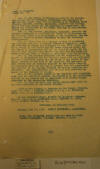
|
May 23, 1927.
Reorganization of Nicaraguan National Guard,
US
Military Attaché A. W. Bloor, p. 3.
" . . . Incl. to
Accompany ¶ Report No. 50. ¶ Art. 10. The
School of Instruction will be the
preparatory center for all officers,
individuals and employees of the National
Guard. They will go through it to establish
their fitness, aptitude, merits, physically,
mentally and morally; and in the same manner
all the aspirants or substitutes, officers
and individuals of the Guard, that may be
successively called for service. ¶ Art. 11.
The grounds, buildings, equipment, utensils
and elements necessary to establish the
School of Instruction and the National Guard
will be provided by the Government, and the
Executive Power is hereby authorized to make
the necessary disbursements. ¶ Art. 12.
There will be a special service of
provisions and supplies that will be called
“Office of Supplies”, under the Minister of
Police and organized by him. This office
will be in charge of the provisions and
other supplies needed for the School of
Instruction and for the National Guard. The
Executive will regulate this service and
will fix the bonds for those handling funds
or stamps in accordance with the amounts. ¶
Art. 13. The expense necessary for the
maintenance of the School of Instruction and
the National Guard will be authorized by
their respective chiefs and the Chief of the
Office of Supplies, subject to the laws of
the Republic; the employees of this office
will be strictly required to keep their
accounts in conformity with the law and to
present them for examination and approval to
the Supreme Tribunal of Cuentas (Auditing
Department). All disbursements will be made
with previous approval of the Minister of
Police. ¶ Art. 14. The General Budget of the
Republic will apportion each year the amount
or amounts corresponding to the institution
created by the present law in accordance
with partial budget submitted by the
respective Ministers. ¶ Art. 15. This law
will take effect immediately after it has
been published in the Gaceta Oficial. ¶
Given in the Chamber of Sessions of the
Senate, Managua, April 23, 1925. – FEDERICO
SACASA G. S. P. – J. SEBASTIAN URIZA, 8-S.
J. L. SALAZAR,-S.S.- ¶ To the Executive
Power, Chamber of Deputies.- Managua, May
14, 1925,- H. A. CASTELLON,-D.S.- VINCENTE
F. PEREZ, D. P.- AQUILEO VENERIO.-D. S.- ¶
THEREFORE, BE COMPLIED WITH; ¶ Managua, May
15, 1925. CARLOS SOLORZANO.- B. MARTINEZ. ¶
(Note: The foregoing translation with made
by Major Daniel Rodriguez, U.S. Army,
retired. A.W.B.)"
|
|
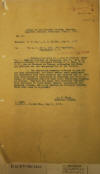
|
June 9, 1927.
General Order No. 1, National Guard of
Nicaragua,
US Military Attaché A. W. Bloor,
p. 1.
"Office of the
Military Attache, American Legation,
Managua, Nicaragua, June 9, 1927. ¶ No. 54.
¶ Subject: G. O. No. 1., N. G. de Nic., May
21, 1927. ¶ To: The A. C. of S., G-2., War
Department, Washington, D. C. ¶ 1. Enclosed
herewith is a copy of General Order No. 1.,
Guardia Nacional de Nicaragua, May 21, 1927,
recently published by Lieutenant Colonel R.
Y. Rhea, U. S. M. C., who is Director in
Charge, outlineing [outlining] his plans and
policies for the reorganization of the
Guardia. ¶ 2. The recruiting campaign
referred to has not yet been inaugurated,
but about twenty local applicants for
enlistment have been accepted and enlisted
and Lt. Col. Rhea anticipates no difficulty
in obtaining the required number of
qualified recruits soon after recruiting
campaign is started. Recruits are being very
carefully selected with reference to their
moral, mental, educational and physical
fitness, and in my opinion an efficient
Constabulary will soon be organized. ¶ A. W.
Bloor, ¶ Military Attache. ¶ 1. Incl. ¶
G.O.No.1., G.N. de Nic., May 21, 1927. . . .
"
|
|
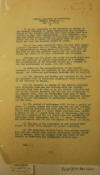
|
June 9, 1927.
General Order No. 1, National Guard of
Nicaragua,
US Military Attaché A. W. Bloor,
p. 2.
" . . . GUARDIA
NACIONAL DE NICARAGUA. ¶ GENERAL ORDER NO.
1. ¶ May 21, 1927. ¶ It is the intention of
the Director in charge of the Guardia
Nacional to start immediately the
reorganization of the Guardia upon the new
lines which have been adopted to make this
organization a most efficient one; one upon
which every citizen of Nicaragua will look
with pride; and one in which its personnel
will be glad to serve and have the highest
spirit de corps. ¶ One of the most essential
facts to make this organization a national
one is, first and last, that it shall be
non-partisan in every sense of the word. If
this is not true it can not possibly carry
out the services and duties for which it is
duly authorized and intended. ¶ Politics has
it place and power but must never control
the military or police organization of a
country. The organization of the National
Police of a country is for the maintenance
of peace, law and order. ¶ To carry out the
reorganization of the Guardia Nacional as
adopted and approved by the President of
Nicaragua, the following preliminary methods
will be adopted: ¶ (a) All officers and
cadets now attached to the Guardia Nacional
will be honorably discharged when directed
by the Director in charge. ¶ (b) The
Director in charge of the Guardia Nacional
will discharge such men now serving with the
Guardia Nacional from time to time as he may
direct. Enlisted men now in the Guardia
Nacional and who are not discharged at the
present time, will be discharged from time
to time upon their own application as the
Guardia Nacional becomes filled by new
enlistments in sufficient numbers to offset
the loss. ¶ (c) The period of enlistment
will be for a period of three (3) years,
except for those men who are now serving in
the Guardia Nacional and have served in same
for a period of more than one (1) year.
These excepted men, within a period of one
(1) month from date of discharge, may enlist
for a period of two (2) years with the
priviledge [privilege] of extending their
enlistment for one (1) year. Thereafter all
enlistments will be for the period of three
(3) years. ¶ (d) The pay of the personnel as
now carried will remain in force until
changed by proper authority. ¶ (e) All
absentees without leave from proper
authority, who are absent when ordered
discharged by the Director in charge, shall
be dropped from the rolls of the Guardia as
deserters and discharged without pay. ¶
Incl. 1. . . . "
|
|
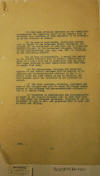
|
June 9, 1927.
General Order No. 1, National Guard of
Nicaragua,
US Military Attaché A. W. Bloor,
p. 3.
" . . . (f) Only such
civilian employees as are absolutely
necessaryfor [necessary for] the immediate
needs of the Guardia will be retained. The
retention of such employees to be determined
by the Director in charge. ¶ (g) As soon as
practicable, recruiting offices will be
opened in the principal cities throughout
the country for the enlistment of desirable
men to bring the Guardia Nacional to its
authorized strength. Notice as to the
qualifications, pay, age, etc. will be
furnished by the recruiting officer. ¶ (h)
As soon as practicable, a school for cadets
in the Guardia Nacional will be opened.
Notice will be given at a later date and in
sufficient time in order that those desiring
to make application will have time to comply
with same. ¶ (i) The instruction, training
and necessary schools of the Guardia
Nacional will be carried on by officers and
non-commissioned officers of the U. S.
Marine Corps and such others as may be
detailed for that purpose under the
direction of the Director in charge. ¶ (j)
The food, quarters, clothing, equipment and
care of the enlisted men will be under the
direct supervision of the officers and
non-commissioned officers of the U. S.
Marine Corps. ¶ (k) Promotion to
commissioned and non-commissioned ranks in
the Guardia Nacional will be made from time
to time among the enlisted personnel.
Opportunity for advancement is open to all,
and promotion will be made only on merit and
ability. ¶ Incl. 1."
|
|
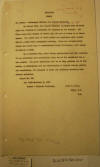
|
November 8,
1929.
"Nicaraguan Officers for Guardia Nacional,"
US
Military Attaché Major Fred T. Cruse,
San José.
"NICARAGUA ¶ COMBAT ¶
No. 6700-b – Nicaraguan Officers for Guardia
Nacional. ¶ On October 24th, the Guardia
Nacional announced that it would begin the
training of candidates for officers in the
Guardia. The first class will consist of
twelve men, who are of course to be
Nicaraguans. The course will be three months
and candidates will receive $50.00 a month
while undergoing training. Those who
satisfactorily finish the course will be
commissioned Second Lieutenants, with salary
of $150.00 a month. ¶ Up to November 5th,
about twenty applications had been received.
It was noticeable that practically every one
of the candidates was a law student. The
great difficulty will be to keep politics
out of the matter, as Nicaraguans are not
conservative or liberal through political
convictions, but actually by birth and
tradition extending back several centuries.
¶ Report No. 555 ¶ San José--November 8,
1929 ¶ Source – Personal knowledge. ¶ Fred
T. Cruse, ¶ Major, G.S. ¶ M.A."
|
|
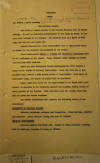
|
March 18, 1930.
"New Military School" of the Guardia
Nacional in the Campo de Marte, Managua,
report submitted in the absence of the
US
Military Attaché,
San José, p. 1.
"NICARAGUA ¶ COMBAT ¶
No. 6700-b – Training of Officers of Guardia
Nacional ¶ New Military School. ¶ The
Military School annexed to the Guardia
Nacional will be opened shortly. It will be
installed provisionally in the Campo de
Marte, in the part which belongs to the
Guardia. Its Director will be a Major of
that body, who has not been named yet. ¶
General McDougal has given instructions that
an appropriate place be chosen for the
definite establishment of the school. ¶
First Lieutenants, Edward J. Trumble and
Francis J. Cunningham will be the Professors
of the school. These officers speak spanish
[Spanish] correctly and have been well
educated. ¶ There are nine Nicaraguan Second
Lieutenants who will receive a three months
course of Military instruction. Those who
have had no preparation will receive a nine
months course of instruction. When there is
sufficient money, the number of pupils will
be increased. ¶ Later, they will leave for
the Departments of the North with their
chiefs, to practice in the mountains against
the bandits, taking charge of small patrols
of the Guardia. This work will last two
months, when they will be given one months
vacation. ¶ The Second Lieutenants will
receive the following course of
instructions: ¶ DEPARTMENT OF MILITARY
SCIENCE ¶ Infantry exercises, ceremony and
inspection. Guard Service, interior and
exterior. Minor tactics, riding and care of
animals. ¶ MILITARY INTELLIGENCE ¶ Personal
hygiene and First Aid. Manual of Arms,
military courtesy, care of uniforms,
business of being an officer. . . . "
|
|
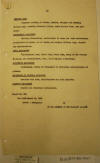
|
March 18, 1930.
"New Military School" of the Guardia
Nacional in the Campo de Marte, Managua,
report submitted in the absence of the
US
Military Attaché,
San José, p. 2.
" . . . INFANTRY ARMS
¶ Complete handling of rifles, pistols,
Thompson and Browning Machine guns, Browning
Automatic Rifles, Lewis Machine Guns, hand
grenades. ¶ ENGINEERING DEPARTMENT ¶
Military Engineering, construction of roads
and their maintenance, purification of
water, art of making and reading military
maps, signals and communications. ¶ LEGAL
DEPARTMENT ¶ International laws, Civil Code,
Penal Code, Study of the Guardia Nacional,
its establishment, etc., Court Martial
proceedings. ¶ ACCOUNTING DEPARTMENT ¶
Bookkeeping, Duties of Commanders of
Districts, administration of prisons. ¶
DEPARTMENT OF PHYSICAL EDUCATION ¶ Exercise
with arms, callisthenics [calisthenics] and
with bayonets. ¶ ACADEMIC DEPARTMENT ¶
English and elementary mathematics. ¶ Report
No. 691 ¶ San José--March 18, 1930 ¶ Source
– Newspapers ¶ By ¶ IN THE ABSENCE OF THE
MILITARY ATTACHÉ"
|
|
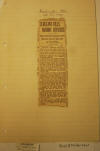
|
April 20, 1930.
"Sergeant Kills Marine Officers," newspaper
clipping from the
Washington Star.
"SERGEANT KILLS
MARINE OFFICERS ¶ Disgruntled Nicaraguan
Turns Machine Gun on Quarters as Two Sleep.
¶ By the Associated Press ¶ MANAGUA,
Nicaragua, April 19.—Shot down in their
sleep, Acting Capt. Veryl H. Dartt of
Nashville, Tenn., and Lieut. James O. Young
of Toledo, Ohio, United States Marines
attached to the Nacaraguan [Nicaraguan]
national guard, were killed at Jicaro
yesterday by a disgruntled Nicaraguan
sergeant. ¶ The sergeant, who recently had
been demoted to a corporal because of
drunkenness, overpowered a sentry and turned
a machine gun on the officers’ quarters,
firing 52 shots before the awakened
guardsmen surrounded and killed him. His
name was given as Morales in reports
received in Managua today. In addition to
killing the two American officers, the
machine gun fire seriously wounded Sergt.
Gonzales, who was expected to die. ¶ The
tragedy took place at the Jicaro
headquarters of the national guard first
battalion, which is stationed at the
northernmost outpost near the Honduran
frontier. It was officially reported that
all other sections were quiet. ¶ Acting
Capt. Dartt was a lieutenant in the United
States Marine Corps. His home was in
Nashville, where he was recently married,
and his wife, Mrs. Ruth S. Dartt, now
resides there. Lieut. Young, whose home was
in Toledo, was a sergeant in the Marine
Corps. His mother, Mrs. Susie B. Liebster,
lives in Toledo. ¶ First reports of the
shooting were received in Managua with the
arrival of an airplane from Jicaro carrying
the bodies of the two dead officers. The
transport Chaumont sails on April 23, and
the bodies probably will be sent home aboard
it. ¶ It was not known whether Morales was
drunk when he committed his act, but it was
inferred that his motive in opening the
machine gun fire was revenge."
|
|
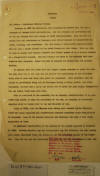
|
3 June 1930.
"Historical Military Policy" in Nicaragua,
US
Military Attaché Major Fred T. Cruse,
San José, p. 1.
"NICARAGUA ¶ COMBAT ¶
No. 6000-a – Historical Military Policy. ¶
Previous to 1927 the Nicaraguan Army
consisted of drafted men, and had a strength
of between 2,000 and 3,000 men. All the
officers and practically all of the men
changed with each change of PARTY
Administration. This was for the reason that
all inhabitants of Nicaragua were either
Liberal or Conservative by birth, training,
and conviction. For this reason a
Conservative Administration did not have a
single Liberal in the Armed forces and vice
versa. This was true to such an extent that
General Officers were always spoken of as a
Liberal General or a Conservative General.
General Officers and some of the Colonels
held Commissions from Congress. Below the
rank of Colonel the grades were not sharply
defined. ¶ It follows from the above that
the longer a party remained in power the
better grip they had on the Army and the
greater the possibility of the President
being able to name and bring into power his
successor. This condition also resulted in
practically every man in Nicaragua having a
rifle, pistol, and other equipment, because
when a party was driven out of power its
Army simply disappeared, the men taking
their arms with them. ¶ This in turn, lead
to the necessity for an incoming
Administration to be provided with plenty of
arms and ammunition of its own, as normally
no Government supplies would be turned over
to the new Minister of War. ¶ Early in 1928,
when the Marines were taking over control
and the National Guard was being organized
all Conservative Generals submitted their
resignations to Congress. Some of the
Liberal Generals did likewise, but only a
very small proportion of them. ¶ An
excellent illustration of the working of the
system appeared in Honduras in 1928. Between
election day and inauguration day the
Liberals, who were coming into power,
organized their own forces in all the
principal cities of the Republic. They did
not ask the Government for arms nor for any
assistance at all, but . . . "
|
|
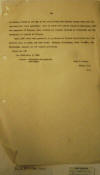
|
3 June 1930.
"Historical Military Policy" in Nicaragua,
US
Military Attaché Major Fred T. Cruse,
San José, p. 2.
" . . . at eleven
o’clock on the day of the inauguration the
Liberal forces took over the quartels from
their garrisons. That is about what usedto
[used to] happen in Nicaragua, with the
exception of Managua, where control was
usually obtained by revolution and the
occupation or capture of Managua. ¶ Until
1927 there were generally no garrisons in
Liberal Departments when the Liberals were
in power, and vice versa. Managua,
Chinandega, Leon, Granada, and Bluefields,
usually had the largest garrisons. ¶ Report
No. 741 ¶ San José--June 3, 1930 ¶ Source –
Histories and personal knowledge. ¶ Fred T.
Cruse, ¶ Major, G.S. ¶ M.A."
|
|
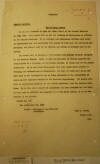
|
July 16, 1930.
"New Military School" in Nicaragua,
US Military Attaché
Major Fred T. Cruse, San José.
"NICARAGUA ¶ GUARDIA
NACIONAL ¶ New Military School. ¶ It was the
intention to open the Cadet School of the
Guardia Nacional on July 15th. This school
will be for the training of Nicaraguans as
officers in the Guardia Nacional. It is
intended that Nicaraguan officers will start
as Lieutenants and that eventually when
enough of them have had sufficient
experience, the greater part of the Marines
now acting as officers will be relieved. ¶
The school will be located in the building
and grounds formerly occupied by the
National Museum. Early in July the Ministry
of Fomento approved the construction of a
building, in the Museum grounds, to house
some of the school activities. Up to date
nine Nicaraguans have been given short
courses of training and commissioned as
Lieutenants, but most of these were young
lawyers whom it was intended to use as Judge
Advocates in the prosecution of cases
against captured bandits in the Northern
Departments. The school will have as
instructors officers of the Guardia
Nacional, that is, American Marines. Up to
July 1st a number of candidates had been
accepted but the Guardia had made no
official announcement as to the exact
number, or as to the details of the course.
¶ Report No. 797 ¶ San José--July 16, 1930 ¶
Source – Newspapers and Personal knowledge.
¶ Fred T. Cruse, ¶ Major, G.S. ¶ M.A."
|
|
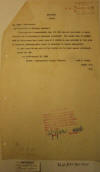
|
August 27, 1930.
"Liability to Military Service"
in Nicaragua,
US Military Attaché Major Fred T.
Cruse, San José.
"NICARAGUA ¶ COMBAT ¶ No. 6240 –
Recruitment. ¶ (a) (Liability to Military
Service.) ¶ Nicaragua has a conscription
law, but this has not been used, as ample
recruits can be obtained by voluntary
enlistment. The normal term of enlistment is
three years but a short term of 6 months is
also provided to take care of temporary
increases which might be necessary to handle
emergencies. ¶ To date about 30 per cent of
the Guardia are in their second enlistment.
¶ Report No. 863 ¶ San José--August 27, 1930
¶ Source – Headquarters Guardia Nacional ¶
Fred T. Cruse, ¶ Major, G.S. ¶ M.A."
|
|
|
|
|
NEXT PAGE |
|
|
|
|
G U A R D I A
M —
D O C S |
|
—1927 |
1928 |
1929 |
1930 |
1931 |
1932 |
1933 + |
|
1
|
2
|
3
|
4
|
5
|
6
|
7
|
8
|
9
|
10
|
11
|
12
|
|
1 2 3
4 5 6 |
1 2 3 4 5 6 |
1 2 3 4 5 6 |
1 2 3
4 5 6 |
1 2 3 4 5 6 |
1 2 3 4 5 6 |
1 2 3 4 5 6 |
1 2 3 4 5 6 |
1 2 3 4
5
6 |
1 2
3 4 5
6 |
1 2
3 4 5 6 |
1 2
3 4 5 6 |
|
MILITARY INTELLIGENCE DIVISION,
RG165, ENTRY 77 —
PAGE 1
•
PAGE 2
•
PAGE 3 |
|
|
|
